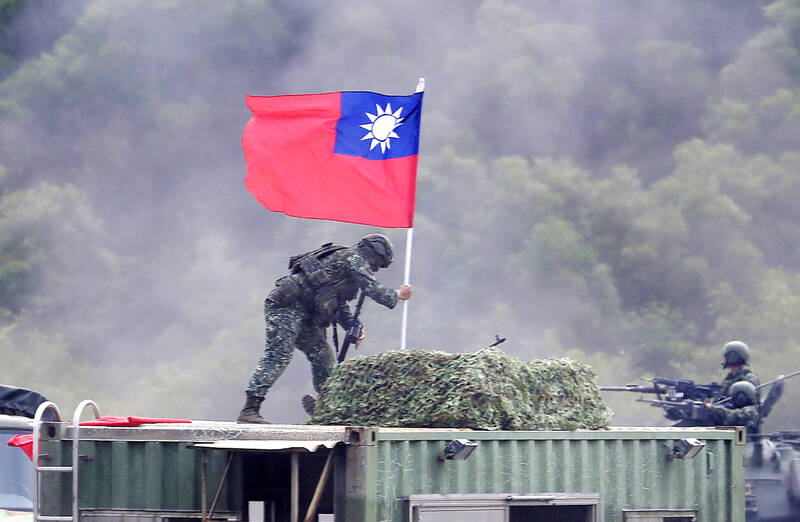Nearly three-quarters of Americans would support the US recognizing Taiwan as an independent country to defend the nation in the event of a Chinese invasion, while a majority supported US defense assistance to Taiwan, a Ronald Reagan Presidential Foundation and Institute poll showed on Thursday.
The institute’s Reagan National Defense Survey assesses perspectives on key issues in defense, national security and foreign policy.
Seventy-two percent of respondents supported the US defending Taiwan by “officially recognizing Taiwan as an independent country” in the event of a Chinese invasion, the poll showed.

Photo: Chiang Ying-ying, AP
The majority also supported the US to take other measures in such a situation, including imposing economic sanctions against China, moving US military assets to the region, sending more military equipment to Taiwan and establishing a no-fly zone in the area, it showed.
Forty-six percent supported committing US ground troops to the defense of Taiwan, with the rate rising yearly from 39 percent in 2019, the institute said.
Beijing’s military buildup and human rights abuses were the most concerning aspects of Chinese activity, with each option selected by 20 percent of respondents, the survey showed.
Asked whether they were concerned about the potential of China invading Taiwan, 31 percent said that they were “extremely concerned” while 42 percent said that they were “somewhat concerned,” it showed.
Support for US security assistance to Israel, Ukraine and Taiwan was 71 percent, 67 percent and 65 percent respectively, it showed.
Support for increasing the US military presence near Taiwan and arms sales to deter China from launching an attack was 60 percent and 55 percent respectively, it showed.
Respondents were more likely to support sending US troops to help Taiwan repel an invasion when informed that the nation has a democratically elected government, and is a major manufacturer of electronics and semiconductors, the institute said.
Seventy-one percent were concerned that Russia’s invasion of Ukraine would prompt other authoritarian countries to invade their democratic neighbors, it said.
Asked if they saw Taiwan as an ally of the US, 64 percent said “yes,” while only 15 percent saw China the same way and 77 percent saw it as an enemy, the poll showed.
Respondents said that the US had superior military capabilities, diplomatic influence and economic strength than China, but Chinese artificial intelligence and cyber capabilities were seen as superior to the US, it showed.
A majority believed that China would gain military power and economic strength at a faster rate than the US over the next decade, the survey showed.
The survey was conducted from Oct. 27 to Nov. 5, garnering responses from 2,506 adults in the US via telephone and the Internet.
It had a confidence level of 95 percent and a margin of error of 2 percentage points.

SECURITY: As China is ‘reshaping’ Hong Kong’s population, Taiwan must raise the eligibility threshold for applications from Hong Kongers, Chiu Chui-cheng said When Hong Kong and Macau citizens apply for residency in Taiwan, it would be under a new category that includes a “national security observation period,” Mainland Affairs Council (MAC) Minister Chiu Chui-cheng (邱垂正) said yesterday. President William Lai (賴清德) on March 13 announced 17 strategies to counter China’s aggression toward Taiwan, including incorporating national security considerations into the review process for residency applications from Hong Kong and Macau citizens. The situation in Hong Kong is constantly changing, Chiu said to media yesterday on the sidelines of the Taipei Technology Run hosted by the Taipei Neihu Technology Park Development Association. With

A US Marine Corps regiment equipped with Naval Strike Missiles (NSM) is set to participate in the upcoming Balikatan 25 exercise in the Luzon Strait, marking the system’s first-ever deployment in the Philippines. US and Philippine officials have separately confirmed that the Navy Marine Expeditionary Ship Interdiction System (NMESIS) — the mobile launch platform for the Naval Strike Missile — would take part in the joint exercise. The missiles are being deployed to “a strategic first island chain chokepoint” in the waters between Taiwan proper and the Philippines, US-based Naval News reported. “The Luzon Strait and Bashi Channel represent a critical access

‘FORM OF PROTEST’: The German Institute Taipei said it was ‘shocked’ to see Nazi symbolism used in connection with political aims as it condemned the incident Sung Chien-liang (宋建樑), who led efforts to recall Democratic Progressive Party (DPP) Legislator Lee Kun-cheng (李坤城), was released on bail of NT$80,000 yesterday amid an outcry over a Nazi armband he wore to questioning the night before. Sung arrived at the New Taipei City District Prosecutors’ Office for questioning in a recall petition forgery case on Tuesday night wearing a red armband bearing a swastika, carrying a copy of Adolf Hitler’s Mein Kampf and giving a Nazi salute. Sung left the building at 1:15am without the armband and apparently covering the book with a coat. This is a serious international scandal and Chinese

COUNTERINTELLIGENCE TRAINING: The ministry said 87.5 percent of the apprehended Chinese agents were reported by service members they tried to lure into becoming spies Taiwanese organized crime, illegal money lenders, temples and civic groups are complicit in Beijing’s infiltration of the armed forces, the Ministry of National Defense (MND) said in a report yesterday. Retired service members who had been turned to Beijing’s cause mainly relied on those channels to infiltrate the Taiwanese military, according to the report to be submitted to lawmakers ahead of tomorrow’s hearing on Chinese espionage in the military. Chinese intelligence typically used blackmail, Internet-based communications, bribery or debts to loan sharks to leverage active service personnel to do its bidding, it said. China’s main goals are to collect intelligence, and develop a